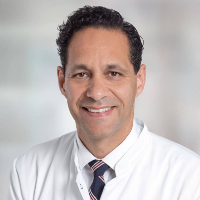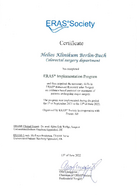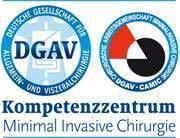Pancreatic Cancer Treatment with Segmental Pancreas Resection in the Best European Hospitals
Treatment prices are regulated by national law of the corresponding countries, but can also include additional hospital coefficients. In order to receive the individual cost calculation, please send us the request and medical records.

Department of General, Abdominal Surgery and Surgical Oncology
The Department of General, Abdominal Surgery and Surgical Oncology offers the full range of services in these medical fields. Whenever possible, operations are performed using minimally invasive techniques, which are the gold standard of modern surgery. The outstanding quality of medical care is confirmed by numerous prestigious certificates, including certificates from the German Cancer Society, the German Hernia Society, etc. In addition, the department provides innovative hyperthermic intraperitoneal chemotherapy (HIPEC), which is available only in the most progressive clinics in Europe.







Department of General and Abdominal Surgery, Colorectal Surgery, Hepatopancreatobiliary Surgery, Hernia Surgery and Bariatric Surgery
The Department of General and Abdominal Surgery, Colorectal Surgery, Hepatopancreatobiliary Surgery, Hernia Surgery and Bariatric Surgery provides the full range of surgical treatment in its field of competence. The department's highly qualified surgeons annually perform about 2,000 surgical interventions. Extensive clinical experience allows the specialists to perform even particularly complex operations. The department’s advanced operating rooms serve for surgery to treat gastrointestinal diseases, liver, gallbladder, bile duct, pancreatic, rectal, anal and colon pathologies. The medical facility also successfully performs operations to treat hernias: inguinal, umbilical, and anterior abdominal wall hernias. In addition, the department's doctors deal with the surgical treatment of morbid obesity. Minor traumatic laparoscopic interventions are considered the gold standard, which guarantee a patient minimal risks and rapid postoperative restoration. Surgeons tell the patient in detail about their upcoming treatment and, in every possible way, support them in their recovery.







Department of General and Abdominal Surgery, Colorectal Surgery, Endocrine Surgery and Hernia Surgery
The Department of General and Abdominal Surgery, Colorectal Surgery, Endocrine Surgery and Hernia Surgery offers the full range of modern surgical interventions in the areas of its specialization. Every year, the medical facility performs more than 2,500 surgical interventions on an inpatient and outpatient basis. The department has vast clinical experience in the field of minimally invasive surgery, which allows the patient to avoid severe pain and prolonged hospitalization. In addition, the department offers robotic surgery using the most modern models of the da Vinci surgical system. The medical facility has the status of the Reference Center for Minimally Invasive Surgery and Hernia Surgery. Surgical treatment of cancer is one of the department's clinical priority focuses. A large number of da Vinci robot-assisted interventions are performed here for gastrointestinal cancers. The department holds a leading position in the use of the da Vinci surgical system in the treatment of rectal and sigmoid cancer patients. The operating rooms of the medical facility are equipped with the very latest technology, while hygiene and safety standards are at the highest level as well. Prior to surgery, the patient undergoes a comprehensive examination. Doctors also assess the risks of the upcoming operation and its expected results. With appropriate clinical indications, preference is always given to minimally invasive surgery.






Pancreatic resection is a partial removal of an organ affected by a tumor process. This operation remains the only way that can potentially lead to a complete cure of the disease. No treatment method can achieve such results, but only surgery. The auxiliary techniques can only reduce the tumor, slow down its growth and increase the patient's life expectancy.
Surgical procedures for pancreatic cancer
Based on the goals of surgical procedures for pancreatic cancer, all of them can be divided into two types:
1. Radical surgical procedures. These surgeries aim to totally remove the tumor in order to cure the patient.
2. Palliative surgical procedures. These surgeries serve to remove only a part of the neoplasm. The surgeon takes measures to normalize the outflow of pancreatic secretion and bile into the small intestine. Also, the nerves responsible for severe pain in pancreatic cancer become damaged, which results in the reduced symptoms of the disease.
Most patients cannot undergo radical surgical procedures, because cancer is usually detected too late. Early detection is possible only if accidentally found during examination for another disease, or if a small tumor is located in the immediate vicinity of the common bile duct. In these cases, the patient sees the doctor and he will diagnose cancer.
The number of patients who are indicated a radical surgical procedure does not exceed 20%. The rest of them are offered palliative surgery, chemotherapy and radiation therapy to prolong life and improve its quality, eliminate the main symptoms of the disease.
In what cases radical surgery can be an option of choice?
Radical surgery can be performed only if the tumor is small, does not spread beyond the limits of the organ and the doctor believes that the tumor can be removed totally. The patients who may be indicated radical pancreatic resection are selected very carefully. The reason for it lies in its high degree of difficulty. Postoperative recovery lasts for weeks and sometimes months.
The difficulty of the postoperative period is due to the fact that the doctor removes most of the organ, as well as nearby structures. When performing surgery, the doctor will resect a part of the stomach, intestines, bile duct and bladder, adjacent lymph nodes. The bile ducts are fed directly to the small intestine.
As for the pancreas, the surgeons usually remove either its head or tail. If during the operation the surgeon finds that the cancer has spread to the body of the pancreas, it may be removed as well. Should the tail of the pancreas be removed, the spleen is usually resected as well. All these things lead to certain consequences that will manifest themselves in the postoperative period. The removal of the spleen will result in the weakened immunity. The resection of certain segments of the pancreas affects the digestive function and causes the deceased production of hormones.
The total pancreatic resection is performed very rarely. A person can live without this organ but its removal causes a constant necessity for insulin injections. It is difficult to control diabetes mellitus, which will develop due to the pancreatic resection. The patient cannot fully digest food after pancreatic resection, which causes the necessity to take enzyme preparations at each meal.
Palliative surgical procedures
Such surgical interventions do not significantly affect the patient's lifespan. However, they can remove the main symptoms, namely reduce pain, prevent or eliminate jaundice and normalize digestion. Such surgical interventions are always more sparing and postoperative recovery is much faster.
In Germany, palliative surgery is often performed using a laparoscopic method. When applying keyhole surgery, postoperative recovery is much faster, has less risks and severe symptoms for the patient.
During the palliative surgical procedure, the pancreatic resection can sometimes be performed to reduce the size of the tumor, as well as the degree of pressure on nearby functionally important structures. The nerves are removed or killed by alcohol so that the patient suffers less pain both in the postoperative period and in case of the further growth of the tumor.
Where can patients undergo treatment?
Thanks to Booking Health, you can undergo surgical treatment for pancreatic cancer in the best hospitals in the world. Depending on the stage, the operations can pursue different goals. The main benefits of medicine in developed countries include:
- mortality during radical surgical interventions is 3 times lower (up to 15% in average hospitals in developing countries, only 5% in specialized German Cancer Centers);
- high-quality care in the postoperative period;
- proper care at any stage of pancreatic cancer;
- modern surgical techniques, the use of laparoscopy;
- high-precision diagnostics, which allows for the perfect treatment planning and determining of the indications for surgery;
- use of additional procedures and methods to make cancer resectable (chemotherapy, radiation) or reduce the risk of recurrence.
You can undergo treatment in the following hospitals:
University Hospital Aachen. The Department of General, Abdominal and Transplant Surgery offers medical procedures to treat pancreatic cancer. Its surgeons annually perform surgeries in at least 3,000 patients. Such pancreatic operations are a regular practice, therefore the doctors have extensive experience in treating pancreatic cancer.
University Hospital Marburg. The doctors of the Department of Abdominal, Thoracic and Vascular Surgery perform about 3,500 operations every year. More than a hundred of them are pancreatic surgeries. The treatment is planned only after a thorough diagnostics. The operation is combined with other medical procedures, such as chemotherapy, radiation therapy.
HELIOS University Hospital Wuppertal. The Department of General and Abdominal Surgery regularly performs operations to treat abdominal malignancies. The diagnostics, medical procedures, chemotherapy and surgical interventions are carried out within the framework of the specialized Pancreatic Cancer Center operating in the department. The department actively uses minimally invasive surgery.
To undergo treatment abroad, you can use Booking Health services. We provide our patients with affordable prices, full-fledged communication with the medical staff and doctors, assist in the selection of the specialized hospital. We fully control the process of diagnostics and treatment, take part in program coordination, ensure control of finances and the return of unspent funds. Booking Health also provides additional services, such as hotel booking, transfer from the airport to the clinic and back.

